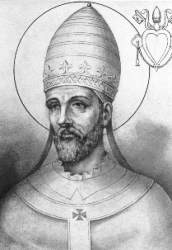 The man chosen to face the storm raised by the Emperor Constans was Martin
from Todi, of noble birth, learned, experienced, and above all a man of
solid virtue. He had served as ambassador to Constantinople and had had
dealings with the Byzantine bureaucracy over the question of the deposition
of Pyrrhus. He was to need all his experience and all his virtue to face
the imperial fury.
The man chosen to face the storm raised by the Emperor Constans was Martin
from Todi, of noble birth, learned, experienced, and above all a man of
solid virtue. He had served as ambassador to Constantinople and had had
dealings with the Byzantine bureaucracy over the question of the deposition
of Pyrrhus. He was to need all his experience and all his virtue to face
the imperial fury.
Scarcely had Martin been consecrated on July S, 649, when he was bombarded
with appeals to make a downright condemnation of Monothelism and a ringing
declaration of the true doctrine that in Christ there are two wills. Martin
held a council in the Lateran attended by 105 bishops. The Fathers strongly
condemned the notion that there is but one will in Christ. They further
condemned the Emperor's Type for daring to silence the teaching of truth.
Prudently the council gave credit to Constans for good intentions, but that
did not appease the furious Emperor.
Constans decided on strong measures. Olympius, his new exarch, was ordered
to force all Italians from the Pope down to accept the Type. But Olympius
found himself at a loss. He tried to persuade the Pope, with no success. He
tried to prevent a schism. In vain. At last he decided to have the strong
and popular Pope assassinated. But what seemed a miraculous intervention
caused Olympius to repent, wash his hands of the affair, and go off to
Sicily to fight Moslem raiders.
Constans was furious. He sent another exarch, Theodore Calliopas to bring
Pope Martin back to Constantinople. Calliopas entered Rome with his armed
cohorts and carried off the unresisting Pope. This terrible voyage took
over a year. The Pope already sick, was reduced to utter misery by the time
the ship landed. He was so weak he could not stand unsupported.
Martin was accused before the imperial court of crimes ranging from
intrigue against the Emperor to lack of faith in regard to the Mother of
God! Weak as he was and in dire peril, Martin could only laugh at the
absurd accusations.
And indeed the witnesses brought against him were so contradictory that the
kindly Pope pleaded that they be excused from testifying on oath lest they
add perjury to false witness.
Constans, determined to break the Pope, had him condemned to death in a
public square with a large crowd to witness his degradation. The crowd,
however, showed by silence its disapproval of the shameful goings on. After
eighty-five days in a Byzantine prison, Pope Martin was exiled to Cherson
in what is now the Crimea. There in that frontier outpost he suffered until
death released him on September 6, 655.
In life Martin was disgraced, loaded with chains and exiled, but after
death, miracles were worked at his tomb. He was hailed as a saint. And to
this day the gallant Pope is regarded as a martyr for the faith not only by
the Roman Church but also by the Greek and the Russian.
Excerpted from "Popes
Through the Ages" by Joseph Brusher, S.J.

